© The Indian Express Pvt Ltd
Latest Comment
Post Comment
Read Comments
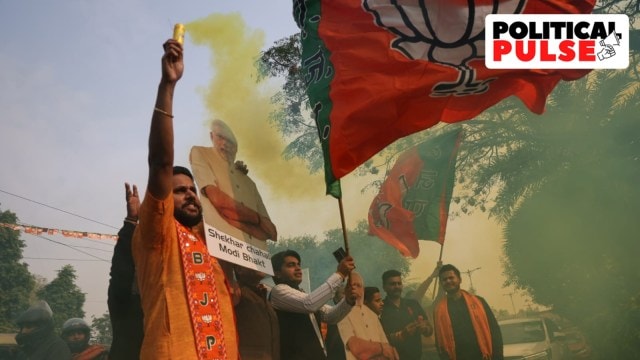 BJP workers celebrating outside the party headquarters in Delhi on Sunday. (Express photo by Tashi Tobgyal)
BJP workers celebrating outside the party headquarters in Delhi on Sunday. (Express photo by Tashi Tobgyal)With counting complete in four of the five states that went to polls last month, the BJP has emerged as the winner in the final round of Assembly polls ahead of the Lok Sabha elections in 2024.
With its landslide win in Madhya Pradesh, and having overturned Congress governments in Rajasthan and Chhattisgarh, the BJP-led National Democratic Alliance is now in power in 17 states and Union Territories. The Congress-led INDIA bloc is in power in 10 states and UTs, while the unaligned YSR Congress Party and Biju Janata Dal hold Andhra Pradesh and Odisha, respectively.
 This is what the map of ruling state governments looks like currently
This is what the map of ruling state governments looks like currently
In the four polling states where results have been announced, here’s how constituencies changed hands between the 2018 and 2023 Assembly elections.
The BJP won 54 seats – a record high for the party in the state – with a vote share of 46.3%. The Congress was reduced to 35 seats and a 42.2% vote share. In 2018, the parties had won 15 and 68 seats, respectively.
Compared to its 2018 tally of 15 seats, the BJP managed to flip 46 seats from other parties, while the Congress flipped 11.
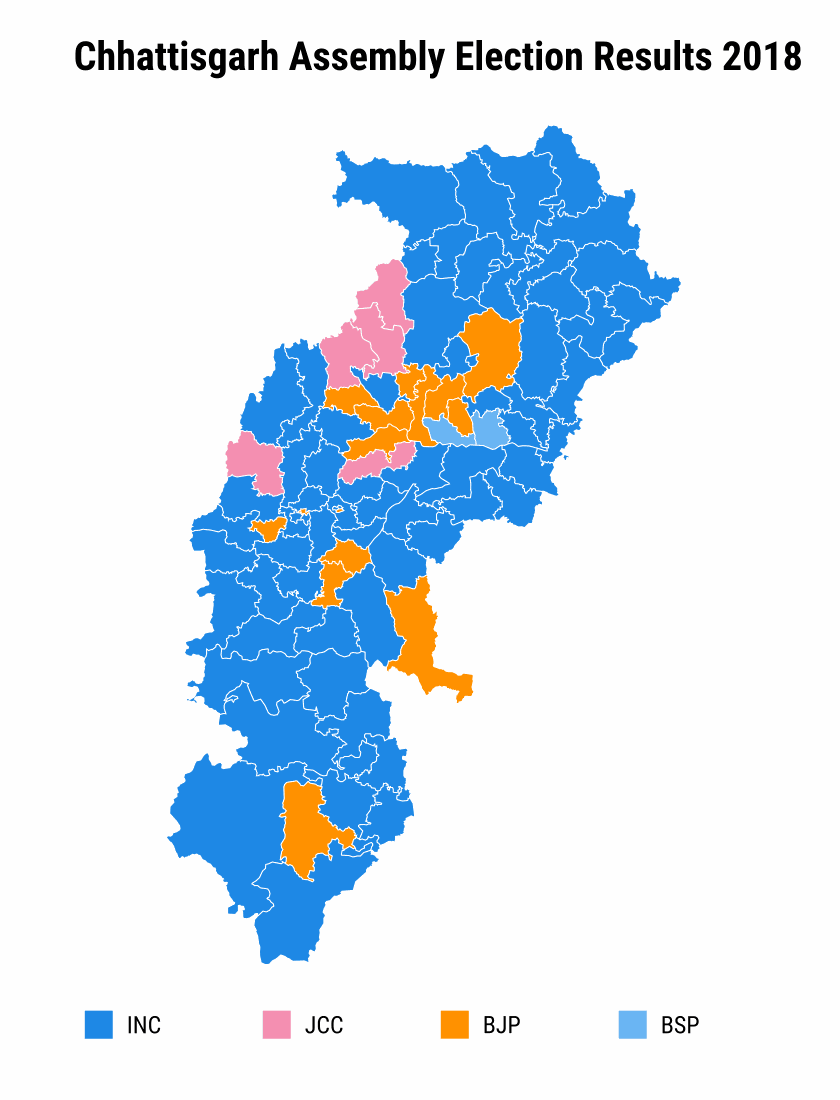 Chhattisgarh Assembly election results in 2018 vs 2023
Chhattisgarh Assembly election results in 2018 vs 2023
Despite the lacklustre approach of its state unit in the last five years, the BJP appeared to have been ready for a “decent” performance. What likely kept the BJP in contention here were the slew of promises it made just days ahead of the first phase of polling on November 7, including cooking gas cylinders at Rs 500 for poor families and Rs 12,000 per year financial assistance to married women. BJP leaders said there was “an instant positive reaction” to the promises.
Baghel fought the elections on three planks– welfare politics, spending as much as Rs 1.75 lakh crore on schemes; soft-Hindutva, having planned the Ram Van Gaman Path i.e., the path the Ram followed during his exile; and invoking the regional Chhattisgarhiya pride. Besides organisation and relentless attack on Baghel over corruption charges, what helped the BJP mop up its biggest ever tally was the introduction of new or fresh candidates in as many as 47 constituencies.
The BJP shrugged off any claims of anti-incumbency, with Shivraj Singh Chouhan extending his record as the state’s longest serving CM. The party returned to power with 164 seats and 48.6% vote share, a jump from 109 seats and 41.6% vote share in 2018. The Congress fell from 114 seats in 2018 to 66 this time. The decline in vote share was less stark – from 41.5% to 40.4%.
Aside from retaining many of its 2018 seats, the BJP managed to flip 74 seats from other parties. The Congress flipped just 22 seats.
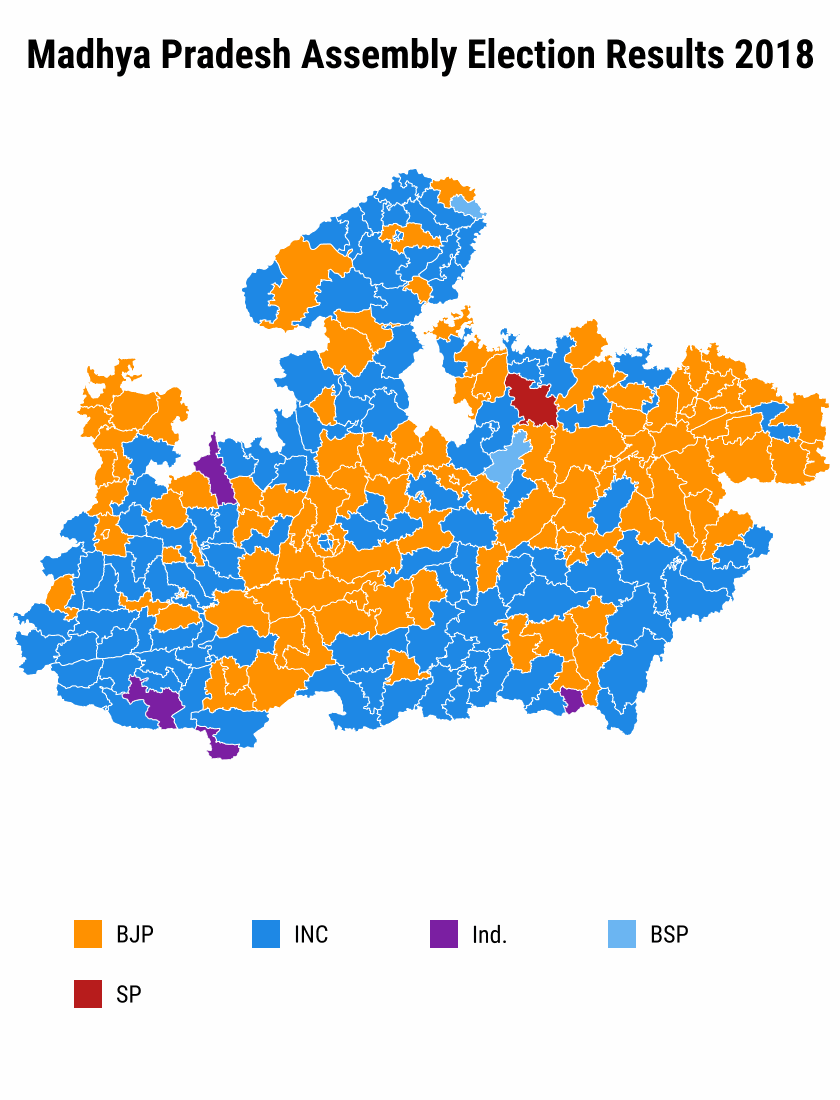 Madhya Pradesh Assembly election results in 2018 vs 2023
Madhya Pradesh Assembly election results in 2018 vs 2023
The BJP, which was grappling with anti-incumbency and infighting among its ranks, managed to turn the election in its favour after Union Home Minister Amit Shah took over the reins of the campaign, troubleshooting factionalism while helping to energise ground-level workers.
Chouhan, who was sidelined by the BJP in the initial stages of the campaign, bounced back riding on his schemes for women, including the gamechanger Ladli Behna Yojana.
The state continued its three decade-long trend of rejecting the incumbent government. The ruling Congress managed just 69 seats and 39.5% of the vote share, compared to the BJP’s 115 seats and 41.7% vote share. In 2018, the Congress had just about hit the majority mark with 100 seats, with help from the BSP, while the BJP won 73.
In terms of flipped seats, the BJP managed to turn 71 seats in its favour compared to the 2018 polls while the Congress managed just 34.
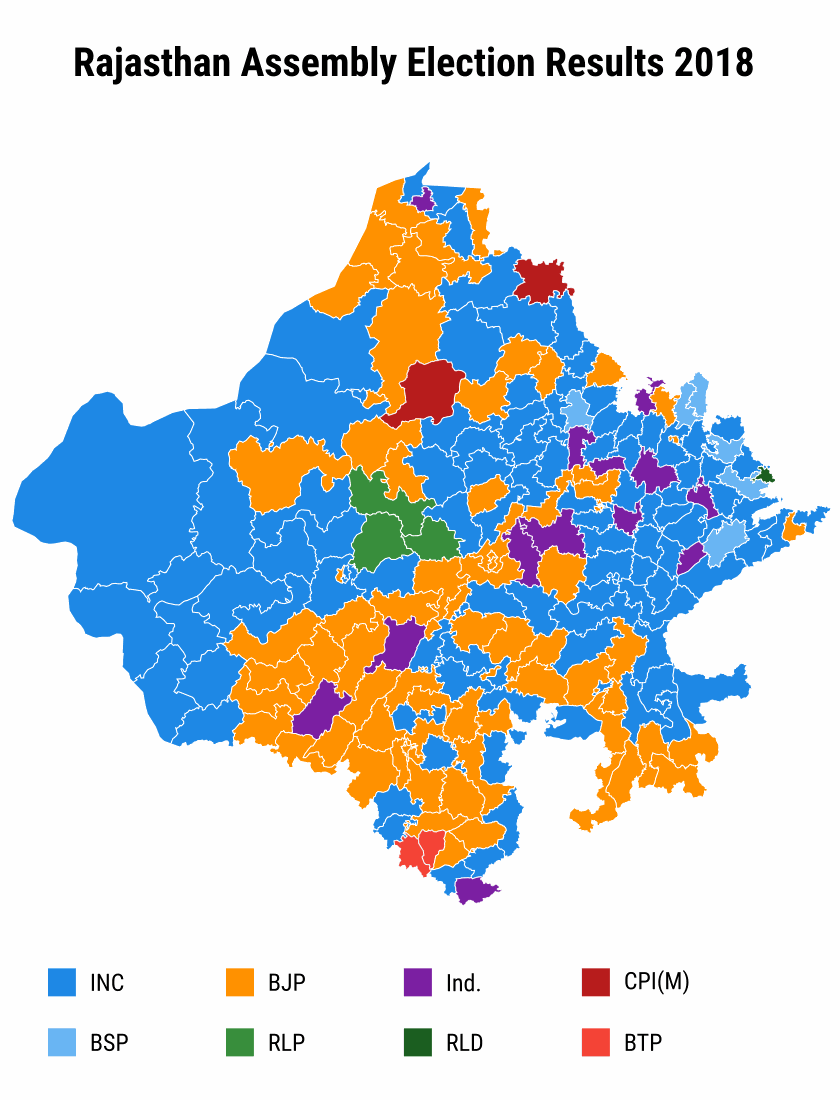 Rajasthan Assembly election results in 2018 vs 2023
Rajasthan Assembly election results in 2018 vs 2023
While Modi and his popularity remained the most significant weapon in its arsenal, the BJP’s campaign against what it called “appeasement politics” of the Ashok Gehlot government appeared to have helped the party in a state where over 90% of the population is Hindu. If there was lack of clarity about its own state leadership, it countered it with a campaign on the deepening differences between Gehlot and Sachin Pilot.
Gehlot termed the results “surprising”, saying he had hoped that the party would win on the basis of his government’s schemes, and that the public would teach the BJP “a lesson for murdering democracy”.
After a disappointing counting day for the Congress, its win in Telangana was a consolation prize. The Congress’s strong performance, with 64 seats and 39.4% of the vote share, solidifies its presence in the South. It saw a considerable improvement from its 2018 tally of 19 seats with a 28.4% vote share. The Bharat Rashtra Samithi and CM K Chandrashekar Rao, known as KCR, failed to complete a hat-trick of wins, securing 39 seats and a 37.4% vote share compared to 88 seats and 46.9% of the votes in 2018.
The Congress managed to flip 51 seats in its favour, compared to just five for the BRS and seven for the BJP, which managed a total of eight seats. The AIMIM managed to retain all seven of its seats in Hyderabad.
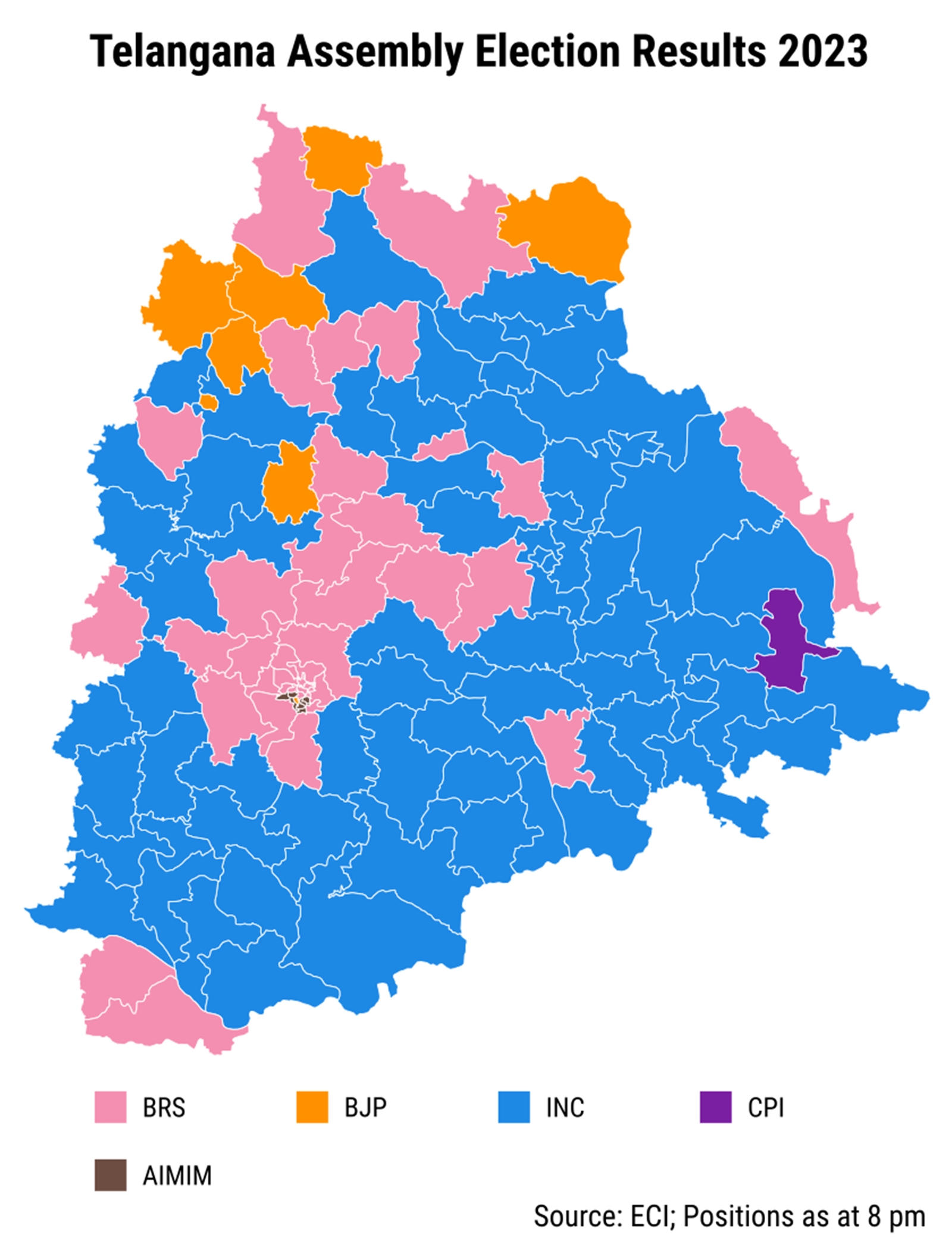 Constituency=wise map of Telangana after Assembly elections, 2023
Constituency=wise map of Telangana after Assembly elections, 2023
Spearheaded by Telangana Congress president A Revanth Reddy, the Congress’s campaign, buoyed by the party’s victory in the May Karnataka polls, dashed the hopes of two-term CM KCR, who was banking on his multiple welfare schemes for various sections.
After more than nine years of the BRS’s rule, it appeared to be mostly a desire for change among a large section of the people, apart from the waning sentiment regarding Telangana, that propelled the Congress to power in the country’s newest state. The BRS’s welfare schemes were countered by similar schemes in enhanced forms that the Congress proposed and seemed to be no match for a “pro-change wave”, especially in rural parts of the state.


